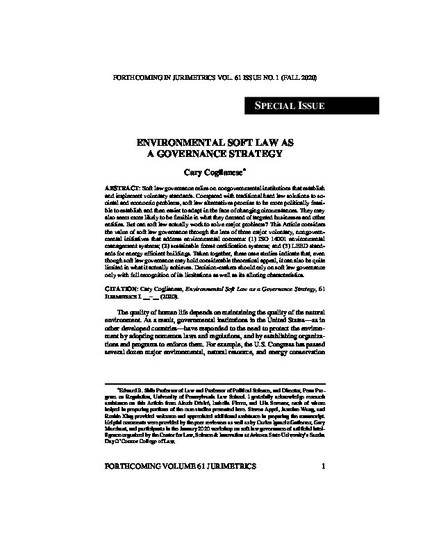
- Economic Policy,
- Energy and Utilities Law,
- Environmental Design,
- Environmental Engineering,
- Environmental Law,
- Environmental Policy,
- Forest Management,
- Law,
- Law and Society,
- Natural Resources Law,
- Natural Resources Management and Policy,
- Policy Design, Analysis, and Evaluation,
- Public Law and Legal Theory,
- Public Policy and
- Sustainability
Soft law governance relies on nongovernmental institutions that establish and implement voluntary standards. Compared with traditional hard law solutions to societal and economic problems, soft law alternatives promise to be more politically feasible to establish and then easier to adapt in the face of changing circumstances. They may also seem more likely to be flexible in what they demand of targeted businesses and other entities. But can soft law actually work to solve major problems? This Article considers the value of soft law governance through the lens of three major voluntary, nongovernmental initiatives that address environmental concerns: (1) ISO 14001 environmental management systems; (2) sustainable forest certification systems; and (3) LEED standards for energy efficient buildings. Taken together, these case studies indicate that, even though soft law governance may hold considerable theoretical appeal, it can also be quite limited in what it actually achieves. Decision-makers should rely on soft law governance only with full recognition of its limitations as well as its alluring characteristics.
- Environmental policy,
- sustainability,
- voluntary regulation,
- standard-setting organizations,
- greenwashing,
- performance measurement,
- International Organization for Standardization,
- Forest Stewardship Council,
- Sustainable Forestry Initiative,
- Leadership in Energy and Environmental Design,
- LEED
Available at: http://works.bepress.com/cary-coglianese/28/

61 Jurimetrics 19 (2020)